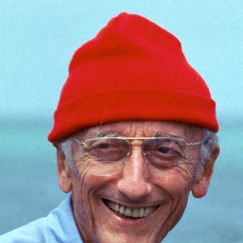Remember that values questions have a “you” in them. The goal is to involve people in relating what they see on the screen to their own lives, not to analyze the filmmaker’s technique or to engage in intellectual criticism. Allow the conversation to flow along a values and feelings track.
Bio/Short Description
A generation of Americans grew up with Jacques-Yves Cousteau, who was famous in the 1960s and 1970s for his non-fiction network TV show, The Undersea World of Jacques Coustaue. Cousteau was a French naval officer, explorer, conservationist, filmmaker, innovator, scientist, photographer, author and researcher who studied the sea and all forms of life in water. He co-developed the Aqua-lung, pioneered marine conservation and was a member of the Académie Française. Cousteau described his underwater world research in a series of books, perhaps the most successful being his first book, The Silent World: A Story of Undersea Discovery and Adventure, published in 1953. Cousteau also directed films, most notably the documentary adaptation of the book, The Silent World, which won a Palme d'Or at the 1956 Cannes Film Festival.



Renee Hobbs
For me, the Jacques Cousteau TV show was my first sustained experience with the documentary form. As a child, it seemed amazing to be able to accompany the crew of the Calypso on their journeys around the world. The show captured the magic of discovery as well as the scientific rigor of the process of research. I was not aware, of course, of how carefully the program was edited to create drama out of life, but when I finally read the work of John Grierson on the documentary genre during my undergraduate years, I made immediate connections to my experience as an engaged viewer of Jacques Cousteau and his amazing (but highly constructed) ocean adventures.
rkochevar
When I was a child, I would watch The Undersea World of Jacques Cousteau. His work in sharing the undersea world inspired me to become a marine biologist and science communicator.